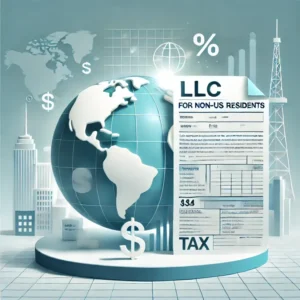In order to create an LLC, you must submit your articles of organization to the state and follow state-specific rules.
This post will focus on LLC taxation for non US residents, such as the rules surrounding it, the rates, and the particulars for certain states.
If you are looking to invest as an expat or high-net-worth individual, which is what I specialize in, you can email me (advice@adamfayed.com) or WhatsApp (+44-7393-450-837).
This includes if you are looking for alternatives or a second opinion.
Some of the facts might change from the time of writing, and nothing written here is formal tax advice.

What is a non resident in the US?
A person who basically doesn’t live in the United States and does not fulfill certain residency requirements is deemed a non-resident.
A non-resident alien is defined for taxation reasons as an individual without a green card or those who fails the so-called substantial presence test, which calls for being physically present in the country for a minimum of 31 days in the current year and 183 days in the last three years.
Does a non resident have to pay tax?

Taxes must be paid by non-residents on income earned in the US. Taxes assessed on their earnings originating in there may differ from those of residents.
They have to submit a tax return using Form 1040-NR.
Can a non-US citizen have an LLC?
Limited liability companies can be formed and owned by non-US citizens.
Although certain state laws may apply that call for a registered agent with an actual residence in that state, there are no federal limitations on foreign ownership of such business structure.
For tax-related reasons, non-citizens also need to get an Employer Identification Number from the IRS.
What is an LLC?
In the US, a Limited Liability Company is a common business structure that blends aspects of partnerships and corporations.
Members of LLCs benefit from restricted liability, which shields their private assets from company debts and lawsuits.
LLCs usually capitalize on non-entity-level taxation, which prevents dual taxation by reporting revenue and loss on the members’ individual tax returns.
How is a foreign LLC taxed in the US?
LLCs with foreign ownership are required to pay levies on income that is directly related to a trade or business in the US.
Non-residents must pay income tax on such income, which may also be liable for withholding tax.
LLC tax calculator for non residents
Although there isn’t an official LLC tax calculator for non-residents, certain online tax calculators can be used to estimate federal and state taxations depending on anticipated earnings and deductions.
To guarantee compliance and precise computations, you should speak with an expert versed in US tax rules or LLC taxation for non US residents in particular.
What is the tax rate for US LLC for non residents?
When a foreign partner participates, the LLC is required to withhold 21% of earnings given to corporate foreign partners and 37% from profits given to non-corporate foreign partners. These earnings are regarded as effectively connected taxable income (ECTI).
Other taxes also apply.
When it comes to federal income tax, a domestic LLC with two or more members is considered a partnership.

For income tax reasons, a single-member LLC serves as an entity that is not considered to be separate from its owner. Both are treated as such unless they choose to be treated as a corporation and file Form 8832.
One-member LLCs are still regarded as distinct entities for the purposes of employment and some excise taxes.
If the LLC chooses to be levied as a C-corp, its taxable income will be subject to a 21% federal corporate tax rate.
A 30% withholding tax will be applied to any dividends paid to non-resident shareholders.
Wyoming LLC taxation for non US residents
There is no franchise or state income taxes in Wyoming.
Any income received from US sources will be assessed a 30% federal withholding tax. The withholding tax may be trimmed or dismissed on specific types of income if the non-resident’s home country and the US have a tax deal.
Delaware LLC taxation for non US residents
An yearly franchise tax is required of all Delaware LLCs, whether or not they operate within the state (min $175 ~ max $250,000).
This tax is due annually on or before March 1 and is not influenced by activity level or income. A $200 penalty and interest are assessed per month for late payments of this tax.
Members’ personal income tax returns must include their profit-sharing information.
Delaware levies a graduated personal income tax rate that varies based on income levels, from 2.2% to 6.6%.
The LLC might also be liable for gross receipts tax, which is determined by the total amount of money made and varies by sector, if it makes money from sales or services.
Pained by financial indecision?

Adam is an internationally recognised author on financial matters with over 830million answer views on Quora, a widely sold book on Amazon, and a contributor on Forbes.



